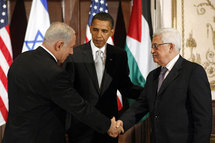Talks may resume, but Mideast peace no closer
Christophe Schmidt
WASHINGTON, Christophe Schmidt- A resumption of long-stalled direct talks between Israel and the Palestinians could be on the horizon, but swift progress towards sealing a peace deal remains a long way off, analysts say.
After months of US-hosted proximity talks which have seen US envoy George Mitchell shuttling between the two sides, direct talks are likely to resume "within the next two months," said former US diplomat Aaron David Miller.

Hopes of new talks have been spurred by the visit to the United States this week of Israeli Prime Minister Benjamin Netanyahu, who emerged from White House talks with US President Barack Obama pledging he wanted a deal.
Obama said he hoped direct talks would start before an Israeli freeze on settlement building in Arab east Jerusalem expires on September 25.
Netanyahu said there were concrete measures the Israelis were willing to make to pave the way, but he has not yet promised to extend the freeze.
"Unlike any previous government" he had decided "to freeze the construction in new settlements for a 10-month period to encourage the Palestinians to enter peace talks," Netanyahu said Thursday in a speech to a US think-tank.
"We should not waste any more time," he added.
In an interview with CNN, the Israeli premier also renewed a call for Palestinian president Mahmud Abbas to enter negotiations "right now, we don't need any pretext or precondition."
The United States and Jordan both voiced hope Thursday that Israelis and Palestinians would start direct negotiations soon.
"We both believe that moving to direct talks as soon as possible is in the best interest of Israelis, Palestinians, the region and the world," Secretary of State Hillary Clinton said alongside Jordan's Foreign Minister Nasser Judeh.
"If the Obama administration wants direct talks, he probably will get them," agreed Nathan Brown, a Middle East expert with the Carnegie Institute. "The larger question is what will happen in those talks."
"There is no indication that the fundamental conditions working against a negotiated two state solution right now -- the opposition of the Israeli government and the impotence of the Palestinian government -- has changed."
Jordan's Judeh said he believed the signs emerging from the proximity talks "seem to be encouraging."
"But I think what we need to refrain from now is unilateral action and provocation, whether it is in the form of deportations or evictions or demolitions," he said referring to the settlement constructions.
The White House meeting this week -- which took place in a warmer atmosphere than Netanyahu's frosty visit to the US earlier this year -- was seen as a major step towards kickstarting direct talks.
It was "critical for trying to coordinate how to avert there being a September crisis, and a September breakdown in negotiations," said Robert Danin, former Jerusalem bureau chief for the Middle East Quartet.
September is set to be a key month in the stagnant peace process. Abbas is due to report to the Arab League on the results of the proximity talks.
And the Quartet -- comprised of the European Union, Russia, the United Nations and the United States -- will meet on the sidelines of the UN General Assembly to discuss the peace process.
Many thorny issues remain unresolved, despite decades of negotiations. Chief among them are the right of return for Palestinian refugees left homeless after the creation of Israel in 1948, and the final status of the holy city of Jerusalem claimed by both as their capital.
To reach a deal, both sides will need to make significant compromises on long entrenched positions which are likely to prove unpopular among their people.
"I don't believe Israelis and Palestinians are prepared to pay the price," said Miller, adding a resumption of direct talks would "put the Palestinians in a very difficult position."
"Even if the settlements moratorium continues, Israelis will be doing other things on the ground in East Jerusalem that will likely embarrass Mahmud Abbas," he said.
And he warned the peace process is likely to bedevil the US administration in the same way that a long trail of broken deals has frustrated successive American presidents.
"If the direct talks don't produce, it's going to mean that the administration will be expected to save the peace process," Miller said.
----------------------------------------------------------------------------